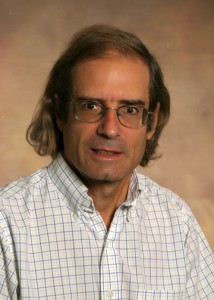
Paul Durbin
Email: durbin@iastate.edu
Phone: 515-294-7234
Title(s):
Joseph C. and Elizabeth A. Anderlik Professor of Engineering
Office
2237 Howe537 Bissell Rd.
Ames, IA 500111096
Information
Links
Education
Ph.D., Applied Mathematics and Theoretical Physics, University of Cambridge, 1979
B.S., Aerospace and Mechanical Science, Princeton University, 1974
Awards and Honors
- Fellow American Physical Society.
- Outstanding research award, ISU Aero Department.
- Distinguished paper award, NASA Lewis Research Center.
Teaching
Undergrad: AerE 311 Compressible Flow, AerE 466 Computational Fluid Dynamics, ME 335 Fluid Mechanics.
Graduate: AerE 541 Incompressible Flow, AerE 546 Computational Fluid Dynamics, AerE 572 Turbulence, AerE 640 Fluid Dynamic Stability.
Research
Interest Areas:
Turbulence
- Closure modeling;
- High fidelity simulation;
- Hybrid modeling;
- Rapid Distortion Theory
Fluid Dynamic Stability and Transition
- Bypass transition;
- High fidelity simulation;
- Predictive modeling
Publications
Selected Publications: (of 190 pubs. including 120 journals, 8 book chapters, 2 books, 60 conf. proceedings; h-index 61)
- Bose, R. Durbin, P.A. (2024) Mixed mode transition in boundary layers: Helical instability, Phys. Rev. Fluids, 9, 063905
- Danis, M., Durbin, P.A. (2023) Hybrid RANS/LES Modeling of Hypersonic Turbulent Boundary Layers with Cold Walls, Int. J. Heat Fluid Flow 107, 109334
- Danis, M., Durbin, P.A. (2022) Compressibility Correction to k-ω Models for Hypersonic Turbulent Boundary Layers, AIAA Journal, 60, pp. 6225–6234
- Varghese, J., Durbin, P.A. (2022) Representation of surface roughness in hybrid turbulence simulations, Flow Turbulence and Combustion,109, pp. 255–277
- Biswas, R, Durbin, P.A., Medic, G. (2019). Development of an elliptic blending lag k-ω model, J. Heat Fluid Flow, 76, pp. 26-39.
- Matai, R., Durbin, P.A. (2019). LES of turbulent flow over a parametric set of bumps, Fluid Mech., 866, pp. 503-525.
- Durbin, P.A. (2018). Recent developments in turbulence closure modeling, Rev. Fluid Mech., 50, pp. 77-103.
- Ismail, U., Zaki, T.A., Durbin, P.A. (2018). Simulations of rib-roughened rough-to-smooth turbulent channel flows J. Fluid Mech., 843, pp. 419-449.
- Durbin, P.A. (2017). Perspectives on the phenomenology and modeling of boundary layer transition, Flow, Turbulence and Combustion, 99, pp.1-23.
- Bose, R. & Durbin, P.A. (2016). Evidence of helical breakdown in transitional boundary layers Rev. Fluids, 1, p. 073602.
- Yin, Z. & Durbin, P.A. (2016). An Adaptive DES Model that Allows Wall-Resolved Eddy Simulation, J. Heat Fluid Flow, 62, pp. 499-509.
- Rudra Reddy, K. Ryon, J. A. & Durbin, P.A. (2014). A DDES model with a Smagorinsky-type eddy viscosity formulation and log-layer mismatch correction, J. Heat Fluid Flow, 50, pp. 103-113.
- Ge, X. Arolla, S. & Durbin, P.A. (2014). A bypass transition model based on the intermittency function, Flow Turb. & Combustion, 93, pp. 37-61.
- Durbin, P.A. & Pettersen-Reif, (2010). Statistical Theory and Modeling for Turbulent Flows, 2nd, John Wiley, ISBN: 978-0-470-68931-8.
Primary Strategic Research Area
Energy Systems